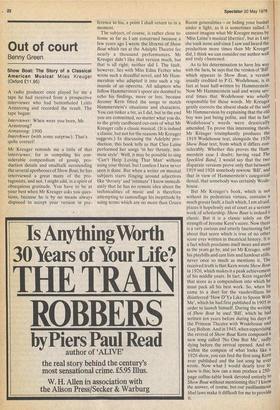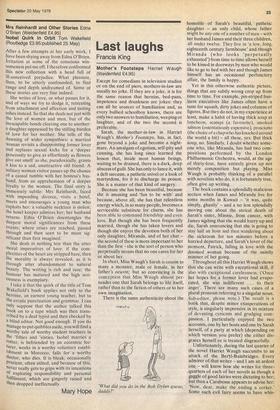Out of court
Benny Green
Show Boat: The Story of a Classical American Musical Miles Kreuger (Oxford £11.95) A radio producer once played for me a tape he had received from a prospective interviewer who had buttonholed Louis Armstrong and recorded the result. The tape began: Interviewer: When were you born, Mr Armstrong?
Armstrong: 1900 Intervkwer (with some surprise): That's quite correct!
Mr Kreuger reminds me a little of that interviewer, for in compiling his considerable compendium of gossip, production details and smalltalk surrounding the several apotheoses of Show Boat, he has interviewed a great many of the protagonists, and not, I might add, in a spirit of obsequious gratitude. You have to be at your best when Mr Kreuger asks you questions, because he is by no means always disposed to accept your version in pre ference to his, a point I shall return to in a moment.
The subject, of course, is rather close to home so far as I am concerned because a few years ago I wrote the libretto of Show Boat which ran at the Adelphi Theatre for nearly a thousand performances. Mr Kreuger didn't like that version much, but that is all right; neither did I. The fault, however, lies with Miss Edna Ferber who wrote such a dreadful novel, and Mr Hammerstein who adapted it into such a rigmarole of an operetta. All adapters who follow Hammerstein's spoor are doomed to echo his findings, more or less, because Jerome Kern fitted the songs to match Hammerstein's situations and characters. You can tinker a bit, as I did, but in the end you are committed, no matter what you do, to the grisly cardboard cut-outs of what Mr Kreuger calls a classic musical. (It is indeed a classic, but not for the reasons Mr Kreuger suggests.) In discussing the Adelphi production, this book tells us that Cleo Laine performed her songs 'in her throaty, intimate style'. Well, it may be possible to sing 'Can't Help Loving That Man' without using your throat, but I confess I have never seen it done. But when a writer on musical subjects starts flinging around adjectives like 'throaty' and 'intimate' I know immediately that he has no remote idea about the technicalities of music and is therefore attempting to camouflage his ineptitude by using terms which are no more than Green Room generalities — or hiding your bushel under a light, as it is sometimes called. I cannot imagine what Mr Kreuger means by 'Miss Laine's musical liberties', but as I say she took none and since I saw and heard the production more times than Mr Kreuger did, I think we can consider our author well and truly chastened.
As to his determination to have his way with the facts, he says that the version of which appears in Show Boat, a version usually credited to P.G. Wodehouse, is in fact at least half-written by Hammerstein.
Now Mr Hammerstein said and wrote several times that Wodehouse was wholly responsible for those words. Mr Kreuger gently corrects the absent shade of the said Mr Hammerstein by explaining that the old boy was just being polite, and that in fact Wodehouse's words were drastically amended. To prove this interesting thesis, Mr Kreuger triumphantly produces the 1919 Wodehouse text, alongside the 1926 Show Boat text, from which it differs considerably. Whether this proves the Hammerstein case I doubt; having read The Speckled Band, I would say that the two disparate versions prove only that between 1919 and 1926 somebody rewrote 'Bill', and that in view of Hammerstein's categorical denial, that somebody was certainly Wodehouse.
But Mr Kreuger's book, which is not without its pedestrian virtues, contains a much graver fault, a fault which, Lam afraid, places it hopelessly out of court as a serious work of scholarship. Show Boat is indeed 2 classic. But it is a classic solely on the strength of Jerome Kern's score. Now there is a very curious and utterly fascinating fact about that score which is true of no other score ever written in theatrical history. It is a fact which proclaims itself more and more as the years go by, and yet Mr Kreuger, with his playbills and cast lists and handout stills, never once so much as mentions it. The received truth is that Kern wrote Show Boat in 1926, which makes it a peak achievement of his middle years. In fact, Kern regarded that score as a compendium into which he must pack all his best work. So, when he came to a duet for the vaudevillians he disinterred 'How D'Ya Like to Spoon With Me', which he had first published in 1905 in order to launch himself. During the writing of Show Boat he used 'Bill', which he had written ten years before during his days at the Princess Theatre with Wodehouse and Guy Bolton. And in 1945, when supervising the revival of Show Boat Kern composed a new song called 'No One But Me', sadly dying before the revival opened. And so, within the compass of what looks like a 1926 show, you can find the first song Kern ever published and the last song he ever wrote. Now what I would dearly love to know is this; how can a man produce a 250' page coffee-table book devoted entirely to Show Boat without mentioning this? I know the answer, of course, but our pusillanimous libel laws make it difficult for me to provide it.
After a few attempts at her early work, I have been shying away from Edna O'Brien. Irritation at some of the conscious winsomeness put me off. I therefore confronted this new collection with a head full of ill-conceived prejudice. What pleasure, then, to be utterly confounded; to find range and depth undreamed of. Some of these stories are very fine indeed.
She writes of love, or what passes for it, and of ways we try to dodge it, retreating from attachment and affection and tasting ashes instead. So that she deals not just with the love of women and men, but of the inescapable bonds cleaving one to another: a daughter oppressed by the stifling burden of love for her mother. She tells of the dawning of wider sympathies: a married woman revisits a disappointing former lover and replaces sexual kicks for a 'deeper generosity to give as effortlessly as flowers give out smell' as she, paradoxically, grants a kiss to a sad, unattractive old friend. A solitary woman visitor passes up the chance of a casual tumble with her hostess's husband, from an apprehension of a deeper loyalty to the woman. The final story is immensely subtle: Mrs Reinhardt, faced With impending divorce, visits a hotel, meets and encourages a young man who exploits her: a valuable necklace is stolen; the hotel keeper admires her; her husband returns. Edna O'Brien disentangles the deepest moral significances from these events; where crises are reached, passed through and then seen to be more significant than first imagined.
She deals in nothing less than the utter moral imperatives of love: if the com plexities of the heart are stripped bare, then the morality is always revealed, as it is through utter abandonment to natural beauty. The writing is rich and sure: the humour has matured and the high seriousness is exemplary.
take it that the quirk of the title of Tom Wakefield's book applies not only to the heroine, an earnest young teacher, but to the erratic punctuation and grammar. I can only suppose that the author talked this book on to a tape which was then trans cribed by a deaf typist and then checked by a blind editor. Not good enough. If you do Manage to put quibbles aside, you will find a worthy tale of worthy student teachers in the 'fifties and 'sixties. Isobel marries a totter, is befriended by an eccentric lecturer, works in a worthy voluntary establishment in Morocco, falls for a worthy doctor, who dies. It is bleak, occasionally Prurient, often stilted, and because of this, never really gets to grips with its intentions of exploring responsibility and personal fulfilment, which are gingerly raised and then dropped ineffectually.



































 Previous page
Previous page